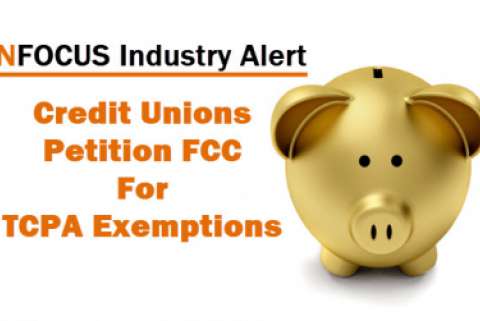On Friday, a petition was filed with the FCC seeking regulatory relief for credit unions from unnecessary requirements that restrict them from communicating with their own members. At issue is the limited ability of credit unions to provide timely financial communication to members due to the TCPA’s restrictive “prior expressed consent” requirement when calling cell phones. In the petition, filed by CUNA (Credit Union National Association), two exemptions were proposed that allow for providing credit union members with necessary information via their cell phones.
CUNA filed the Petition for Declaratory Ruling: Rules and Regulations Implementing the TCPA on September 29, 2017. Their position is that credit union members expect to be provided with timely and possibly critical financial information regarding their accounts. Credit unions are allowed to convey such information to members over a home landline which does not require their “prior consent”. However, if the same member is called on their home cell phone, the credit union may be in violation of TCPA rules if an automatic telephone dialing system (ATDS) initiated the call.
"CUNA is seeking relief today on behalf of America's credit unions and their members from an outdated TCPA statute, which has been made more obsolete for credit unions due to conflicting and confusing FCC interpretations of the statute." -- CUNA President/CEO Jim Nussle
As pointed out in the petition, a recent Centers for Disease Control study showed that 70% of all adults aged 25-34 and of adults renting their homes were living in wireless-only households. The problem for credit unions is that the TCPA creates a barrier of “prior expressed consent” between them and their own members. It makes credit unions unnecessarily vulnerable to class action litigation if their informational calls use an ATDS to call a member whose primary means of communication may only be a cell phone.
Two TCPA Credit Union Exemptions Proposed by CUNA:
- EBR Exemption. The FCC should adopt an Established Business Relationship (EBR) exemption for credit union informational messages to cell phones. Adopting this exemption would place cell phone calls on equal regulatory footing with similar calls made to landline phones.
- Free Call Exemption. The FCC should utilize its express authority to exempt calls that are without charge to the called party. Exempt credit union informational calls and texts that are in fact free to the called party because the call is free, under the called party’s wireless plan.
CUNA wants the FCC to issue a declaratory ruling that wireless informational calls to credit union member-owners with whom the credit union has an established business relationship, or where the call or text is in fact free, be exempt from the TCPA’s “prior express consent” requirement for autodialed and artificial or prerecorded voice calls.
Conclusion
The FCC’s Declaratory Ruling and Order adopted in 2015 made it extremely difficult for credit unions to contact their members about potentially fraudulent activity on their accounts as well as to provide timely financial information. The problem lies with the outdated distinction between mobile and residential phones.
In today’s tech savvy world, cell phones have largely replaced landlines. Most consumers don’t know about the TCPA or understand that a regulatory restriction determines how information is relayed to their cell phone or a landline. The FCC should remove any such divisions relative to automated informational calls to consumers about their existing accounts.
The FCC needs to put consumers first and not treat credit unions and other financial institutions as if they are the enemy. Financial institutions are service providers and their customers expect that their finances are secure and they will be notified of changes and of new opportunities that could affect their financial positions.
The TCPA was put in place to restrict and punish abusive telemarketing practices; not to prevent legitimate business from contacting their customers. The FCC needs to provide a clear distinction between the two and not vilify all telemarketers and businesses as preying on unsuspecting consumers. Most financial services businesses which the FCC categorizes as telemarketing predators do in fact provide useful services that are appreciated by their customers.





